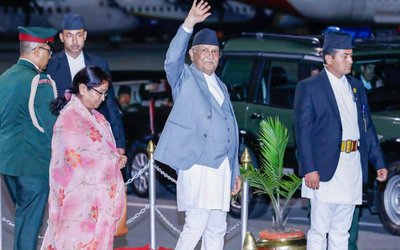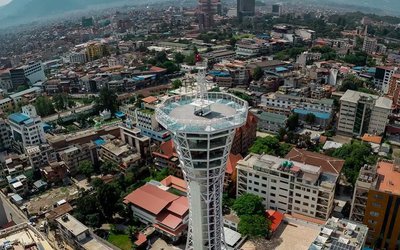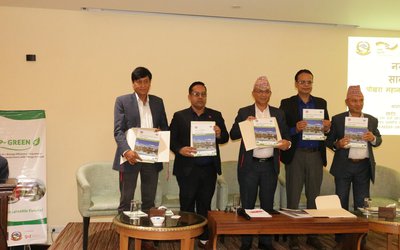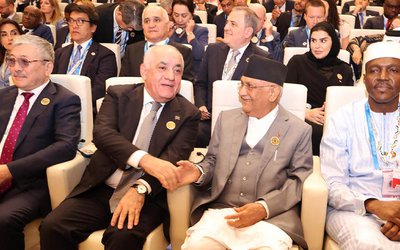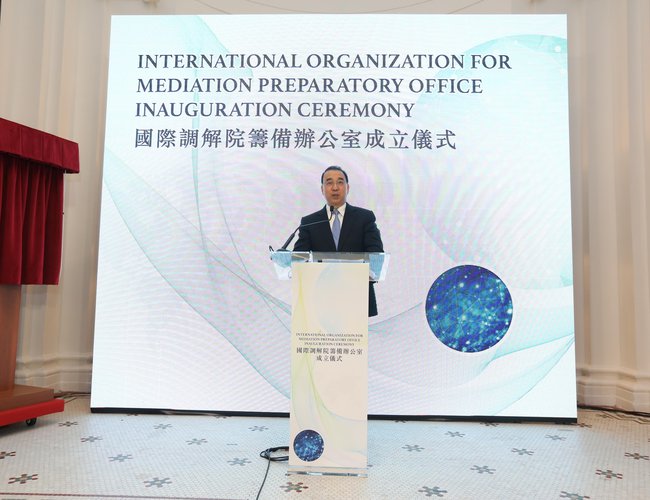
A World Tired of Gavel-Banging
Let’s face it: the 21st century has been a geopolitical rollercoaster. From trade wars to territorial spats, the international community often resembles a quarrelsome family reunion—except the stakes are nuclear codes and trillion-dollar economies. Enter the International Organization for Mediation (IOMed), set to open its doors in Hong Kong by late 2025. This isn’t just another bureaucratic body; it’s a bold experiment in rewriting the rules of global diplomacy. For South Asia—a region no stranger to disputes—this could be the start of a new playbook.
The IOMed, headquartered in the refurbished Wan Chai Police Station (a fitting metaphor: turning a colonial-era symbol of authority into a temple of compromise), represents China’s answer to a world fatigued by Western-dominated legal institutions. As Foreign Minister Wang Yi prepares to inaugurate the body on May 30, nearly 60 countries—including Indonesia, Pakistan, and Algeria—are signing up, signalling a tectonic shift toward “diplomacy by dialogue”.
Why Mediation? Because the World Can’t Afford More Drama
Mediation isn’t new. Ancient South Asian texts like the Arthashastra advocated for negotiation over conflict. But in today’s multipolar era, where power is diffuse and trust in institutions like the International Court of Justice (ICJ) is fraying, mediation offers a pragmatic alternative. Unlike arbitration or litigation, which often leave one party feeling like a courtroom loser, mediation prioritises consensus, flexibility, and sovereignty—a “win-win” ethos that resonates deeply in Asia.
Consider the numbers:
- 60% of investor-state disputes escalate to costly arbitration, draining time and resources .
- The average mediation case resolves in 6–12 months, compared to 3–5 years for litigation.
- Hong Kong’s existing arbitration hub handled over 500 cases in 2024 alone, reflecting global confidence in its neutrality.
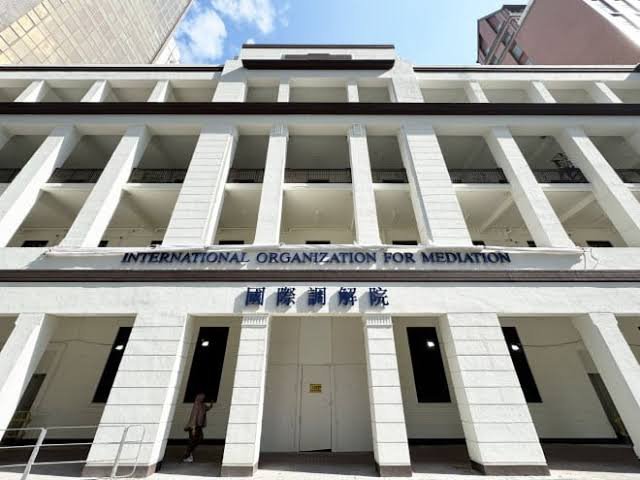
As Jose-Antonio Maurellet, Chairman of the Hong Kong Bar Association, quips: “Mediation is like a good chai—it’s cheaper, faster, and leaves fewer bitter aftertastes”.
Hong Kong: The “Switzerland of the East” in a Post-Western Order
Hong Kong’s selection as IOMed’s home is no accident. Under the “one country, two systems” framework, the city blends Chinese strategic vision with a common law system trusted globally. Its bilingual legal talent (fluent in Mandarin and English) and ranking as the second-most preferred arbitration seat worldwide (after London) make it a natural bridge between East and West.
But this isn’t just about infrastructure. The IOMed embodies China’s Global Security Initiative (GSI), which seeks to replace U.S.-led “rules-based orders” with collaborative frameworks. By positioning Hong Kong as a neutral mediator, Beijing is subtly challenging the West’s monopoly over international law. As Professor Shahla Ali of the University of Hong Kong notes: “The IOMed isn’t about replacing The Hague—it’s about offering a different tablewhere Global South voices aren’t drowned out”.
For South Asia, this is transformative. Pakistan, a founding IOMed signatory, sees it as a counterweight to India’s traditional reliance on Western allies. Meanwhile, Bangladesh and Sri Lanka—caught in debt traps and climate disputes—could leverage IOMed’s cost-effective mediation to avoid predatory arbitration.
The Multipolar Playbook: No More “With Us or Against Us”
The IOMed’s founding philosophy—“Hehe” (harmony)—is rooted in Confucianism but echoes the Gandhian principle of satyagraha. This isn’t mere idealism; it’s a calculated response to a fractured world.
Consider:
- Declining Trust in Western Institutions: The ICJ’s rulings on Gaza and Ukraine have been ignored, while the WTO’s dispute mechanism remains paralysed .
- Rise of the “Neutral Middle”: Nations like India and South Africa increasingly refuse to pick sides in U.S.-China rivalries. IOMed’s flexibility caters to this non-aligned resurgence .
- Economic Pragmatism: With Belt and Road Initiative (BRI) projects sparking disputes from Pakistan to Kenya, China needs a forum to resolve conflicts without Western scrutiny .
Critics argue that IOMed is a Trojan horse for Chinese influence. Yet its design includes safeguards: a “de-hegemonized” charter banning unilateral sanctions and ensuring mediator diversity. As Louis Chen, a Hong Kong legal expert, asserts: “This isn’t China’s court—it’s the world’s living room”.
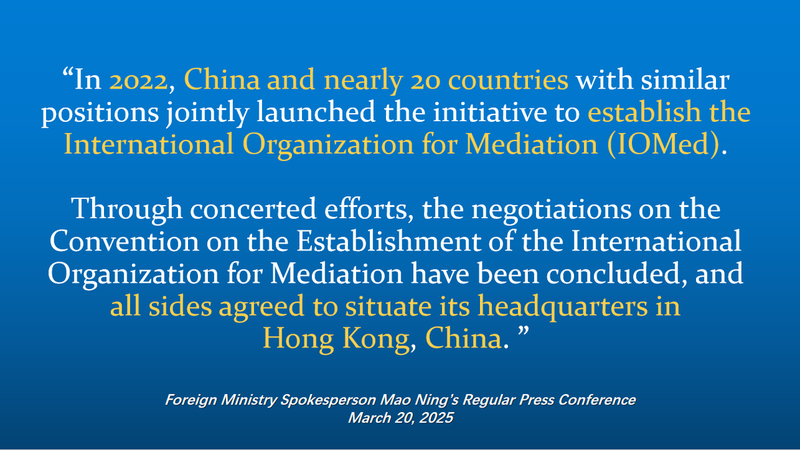
South Asia’s Stake: From Kashmir to Climate Debt
For South Asian policymakers, IOMed offers three strategic advantages:
- Cost-Effective Conflict Resolution: Nepal-India border disputes or Indo-Pak water-sharing talks could bypass years of legal wrangling. Mediation’s informality also protects national pride—a key concern in hyper-sensitive regions .
- Leverage in BRI Negotiations: As BRI projects face local pushback (e.g., Sri Lanka’s Hambantota Port), IOMed provides a neutral venue to renegotiate terms without IMF-style austerity diktats .
- Climate Justice: Small states like the Maldives, drowning in literal and metaphorical debt, could use IOMed to hold polluters accountable without hiring pricey Western lawyers .
The IOMed’s focus on “amicable solutions” also aligns with South Asia’s cultural affinity for panchayats and consensus-building. As a Bangladeshi diplomat joked: “Finally, a global body that understands shushil(civil) diplomacy”.
Challenges: Can IOMed Walk the Talk?
Skepticism is healthy. The IOMed must overcome:
- Perceptions of Chinese Bias: Despite safeguards, Beijing’s role as initiator risks accusations of puppeteering. Hong Kong’s post-2019 political climate adds fuel .
- Implementation Hurdles: Ratifying the IOMed convention requires domestic legal reforms in member states—a process that could take years .
- Competition with Existing Bodies: The Permanent Court of Arbitration (PCA) won’t vanish overnight. IOMed must prove its added value.
Yet, the enthusiasm from Global South nations is telling. Sudan, Serbia, and Laos—all scarred by Western intervention—see IOMed as a “decolonized” alternative. Even the U.N. is sending delegates to the May 30 signing—a quiet endorsement.
The Mediation Century Begins in Hong Kong
The IOMed’s launch is more than a diplomatic milestone; it’s a litmus test for post-Western multilateralism. For South Asia, a region navigating U.S.-China rivalry and internal fractures, this is an opportunity to shape a fairer system. As Wang Yi declared: “Dialogue, not dominance, will define our shared future”.
Will IOMed succeed? Only time will tell. But in a world where even superpowers struggle to agree on the time of day, a little mediation might be just what the doctor ordered. Or, as a Hong Kong taxi driver told me: “Better to talk over dim sum than fight over dumplings”
*Zakir Kibria is a writer and nicotine fugitive. Entrepreneur |Policy Analyst|Chronicler of Entropy | Cognitive Dissident. “Empires decay. Pragmatism
survives. Stay sarcastic.” Email: zk@krishikaaj.com
Références
1 Global Legal Insights. Hong Kong to Establish International Mediation Centre. 2025. [Link](https://www.globallegalinsights.com/news/hong-kong-to-establish-international-mediation-centre/)
2 Global Times. The World Looks Forward to Hong Kong’s New Role. 2025. [Link](https://www.globaltimes.cn/page/202505/1334972.shtml)
3 Mediate.com. New Global Mediation Body in Hong Kong. 2025. [Link](https://mediate.com/news/new-global-mediation-body-could-open-in-hong-kong-as-early-as-end-of-2025/)
4 China Daily HK. Hong Kong as Global Mediation Capital. 2025. [Link](https://www.chinadailyhk.com/article/612384)
5 Global Times. HKSAR Welcomes IOMed. 2025. [Link](https://www.globaltimes.cn/page/202505/1334952.shtml)
6 China Daily Asia. China Spearheads Global Mediation. 2025. [Link](https://www.chinadailyasia.com/article/612543)
7Dynamite News. Hong Kong as Mediation Hub. 2025. [Link](https://www.dynamitenews.com/international/hong-kong-set-to-become-international-mediation-hub-in-significant-global-milestone)
8 Al Diplomasy. China Champions Global Mediation. 2025. [Link](https://www.aldiplomasy.com/en/?p=38083)
9 China Daily HK. Hong Kong Steps into Spotlight. 2025. [Link](https://www.chinadailyhk.com/hk/article/612384)
10 International Cooperation Center. Initiating International Mediation Courts. 2024. [Link](https://en.icc.org.cn/specialties/public_diplomacy/318.html)
- The Tehran Gambit: How America’s War on Iran Accelerated the Birth of a Post-Western World
- Aug 05, 2025
- The Digital Strip Search: How America’s Social Media Visa Edicts Redraw Colonial Borders in Cyberspace
- Jul 14, 2025
- The Iron Silk Road: How a Train to Tehran is Rewriting The World’s Map – And Why The Old Powers Are Terrified
- Jun 25, 2025
- The Kuala Lumpur Pivot: How A Silent Summit In Malaysia Is Rewriting The Global Economic Map
- Jun 16, 2025
- Rivers as Narratives of Peace in South Asia
- May 18, 2025


